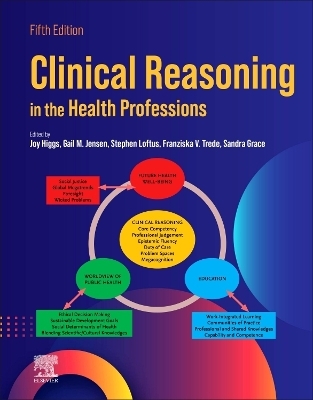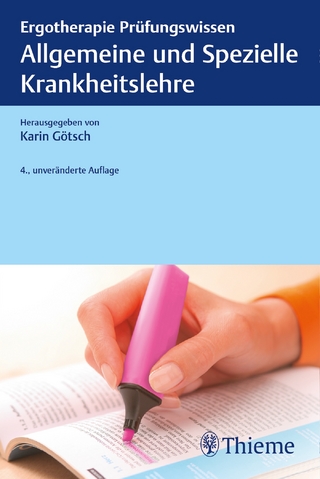
Clinical Reasoning in the Health Professions
Churchill Livingstone (Verlag)
978-0-443-11097-9 (ISBN)
Clinical Reasoning in the Health Professions provides the concepts and frameworks healthcare professionals need to be able to reason effectively, make sound and defensible clinical decisions, and learn from experience as they develop from student to practitioner.
Edited by leading experts in the field from Australia and the US, this fifth edition presents the latest understandings and evidence around clinical reasoning in clinical practice, and how can it be taught and assessed. It’s ideal for both undergraduate and post-graduate health students as well as academic and clinical health educators.
Presents a new understanding of clinical reasoning in the circumstances confronting healthcare systems today
Covers the future of healthcare and social justice
Provides the latest theories on teaching, learning and assessing clinical reasoning - ideal for educators and researchers
Easy to read with figures, tables and chapter summaries
Case studies integrate theory with practice
Examines clinical reasoning as a core competency
Includes team-based care/teaming and the role of shared decision making
New themes
New ways of teaching and assessment
New practical approaches to application of theory and developing a curriculum
Joy has worked for over 35 years as an educator, scholar, researcher and research supervisor at The University of New South Wales, The University of Sydney and Charles Sturt University. She has held appointments as visiting scholar and consultant to a number of Australian and international tertiary institutions. In 2004, Joy received a Member of the Order of Australia award for service to health science education through course development, academic and administrative contributions and research into teaching methods. She was awarded an Australian Teaching and Learning Council Fellowship in 2010. Joy is a member of the Australian Learning and Teaching Fellows Network. In 2015, Joy was appointed a Principal Fellow of the Higher Education Academy, UK. Professor Joy Higgs' key roles at CSU are promoting the advancement of professional practice and education through collaborations in research, scholarship, student supervision, education, organisational change and networking. Joy's research interests are linked to professional practice (the nature of practice across professions, practice wisdom, professionalism, the changing shape of professions in work and society), higher education (quality and innovations), professional education (pedagogies, socialisation, expectations of graduates), practice-based education (pedagogy, curriculum frameworks) and qualitative research strategies. Dr. Jensen is Vice Provost for Learning and Assessment, Dean Emerita, and Professor of Physical Therapy at Creighton University. She is known nationally and internationally for scholarly contributions in expert practice, clinical reasoning, professional ethics, and interprofessional education. Dr. Jensen is author or coauthor of more than 90 publications in peer-reviewed journals and has coauthored 13 books, including the fourth edition of Clinical Reasoning in the Health Professions (Higgs, Jensen, Loftus, Christensen), Educating Physical Therapists, and in 2020, Clinical Reasoning and Decision Making in Physical Therapy. She led the research team that completed a National Study of Excellence and Innovation in Physical Therapist Education funded by the American Physical Therapy Association and several APTA components. She serves on a number of editorial boards and most recently became an associate editor for The Clinical Teacher. Dr. Jensen received her PhD in educational evaluation with a minor in sociology from Stanford University. She holds a master's degree in physical therapy from Stanford University and a bachelor's degree in education from the University of Minnesota. Dr. Loftus joined Oakland University William Beaumont School of Medicine in November 2013 as associate professor of Medical Education. He is responsible for faculty development in medical education. He is also involved in a number of courses such as Medical Humanities and Embark research projects. A dental professional with more than 20 years in medical education, Dr. Loftus developed an internationally recognized inter-professional online graduate course in pain management at Sydney University. His research on clinical reasoning has appeared in several journals and books, such as the well-received book, "Clinical Reasoning in the Health Professions (3rd ed). He has also supervised doctoral research students at Charles Sturt University in Australia, in topics such as clinical reasoning, higher education and clinician/patient relationships. Dr. Loftus works to ensure that students and faculty maximize the benefit of the educational experiences provided in the medical school through coming to a deeper understanding of what is involved in medical education and practice. Franziska Trede is Associate Professor in Higher Education at Charles Sturt University where she leads research, scholarship and practice in professional education and workplace learning. She is a national board member of the Australian Collaborative Education Network. She teaches an open online subject to academics and practitioners on the theory and practice of workplace learning. Her research focuses on professional practice, learner agency and resilience, pedagogy of deliberateness, professional identity development and professionalism. She has developed innovative online capacity building teaching tools using arts-based approaches. Franziska published 7 books and over 80 peer-reviewed papers and has presented her work in Canada, Europe and New Zealand. Her latest book under contract with Springer is titled Education for practice in hybrid spaces: Enhancing professional learning with mobile technology. Dr Sandra Grace is a health services researcher with extensive research experience, including primary health care, practice-based education, models of care and interprofessional education and practice. She has extensive experience as a practitioner, teacher, designer of health training courses and project manager, including grant writing, managing staff and budgets, meeting key performance indicators and preparing project reports.
1 The Future of Healthcare
2 Contexts of Clinical Reasoning: Navigating a World of Increasing Complexity
3 Clinical Reasoning: Challenges of Interpretation and Practice in the Current Era
4 Re-interpreting Clinical Reasoning: a Model of Encultured Decision-making Practice Capabilities
5 Multiple Spaces of Engagement and Influence in Clinical Decision Making
6 A Critical Social Sciences Model for Practice
7 The Development of Clinical Reasoning Expertise
8 The Language of Clinical Reasoning
9 Expertise and Clinical Reasoning
10 Empowerment and Clinical Reasoning
11 Changing Demographic and Cultural Dimensions of Populations: Implications for
Healthcare and Decision Making
12 Multiple Contexts of Healthcare
13 Next-generation Clinical Practice Guidelines
14 Evidence-based Practice and Clinical Reasoning: How Are the Two Related?
15 Collaborative Decision Making in Liquid Times
16 A Model for Clinical Ethics Reasoning in Adult and Paediatric Medicine
17 Cultivating Clinical Reasoning: the Need for the Health Humanities
18 Shared Decision Making in Practice
19 Using Telehealth in Clinical Education: Opportunities, Challenges and Considerations
20 Methods in the Study of Clinical Reasoning
21 Clinical Reasoning and Biomedical Knowledge Implications for Teaching
22 Clinical Reasoning in Medicine
23 Clinical Reasoning in Nursing
24 Clinical Reasoning in Physiotherapy
25 Clinical Reasoning in Dentistry
26 Clinical Reasoning in Occupational Therapy
27 Clinical Decision Making in Paramedicine
28 Decision Making and Clinical Reasoning in Optometry
29 Clinical Reasoning in Dietetics
30 Clinical Reasoning in Pharmacy
31 Speech Pathology: Facilitating Clinical Reasoning
32 Clinical Decision Making Across Orthodox and Complementary Medicine Fields
33 Towards a Clinical Education Pedagogy for Developing Clinical Reasoning Capability
34 Leading a Faculty in Implementing Clinical Reasoning
35 Developing a Curriculum on Clinical Reasoning
36 Teaching Clinical Reasoning to Preclinical Medical Students
37 Teaching Clinical Reasoning in Nursing Education
38 Interprofessional Programmes to Develop Clinical Reasoning
39 Teaching Clinical Reasoning in Paramedicine
40 Developing Clinical Reasoning Capability
41 Learning to Communicate Clinical Reasoning
42 Learning to Research Clinical Reasoning
43 Clinical Decision Making, Culture and Health
44 Learning About Factors Influencing Clinical Decision Making
45 Peer Learning to Develop Clinical Reasoning Abilities
46 Assessing Clinical Reasoning in Medicine
47 Clinical Reasoning Education: Looking to the Future
| Erscheinungsdatum | 03.09.2024 |
|---|---|
| Verlagsort | London |
| Sprache | englisch |
| Maße | 191 x 235 mm |
| Themenwelt | Medizin / Pharmazie ► Pflege |
| Medizin / Pharmazie ► Physiotherapie / Ergotherapie ► Ergotherapie | |
| ISBN-10 | 0-443-11097-2 / 0443110972 |
| ISBN-13 | 978-0-443-11097-9 / 9780443110979 |
| Zustand | Neuware |
| Informationen gemäß Produktsicherheitsverordnung (GPSR) | |
| Haben Sie eine Frage zum Produkt? |
aus dem Bereich


